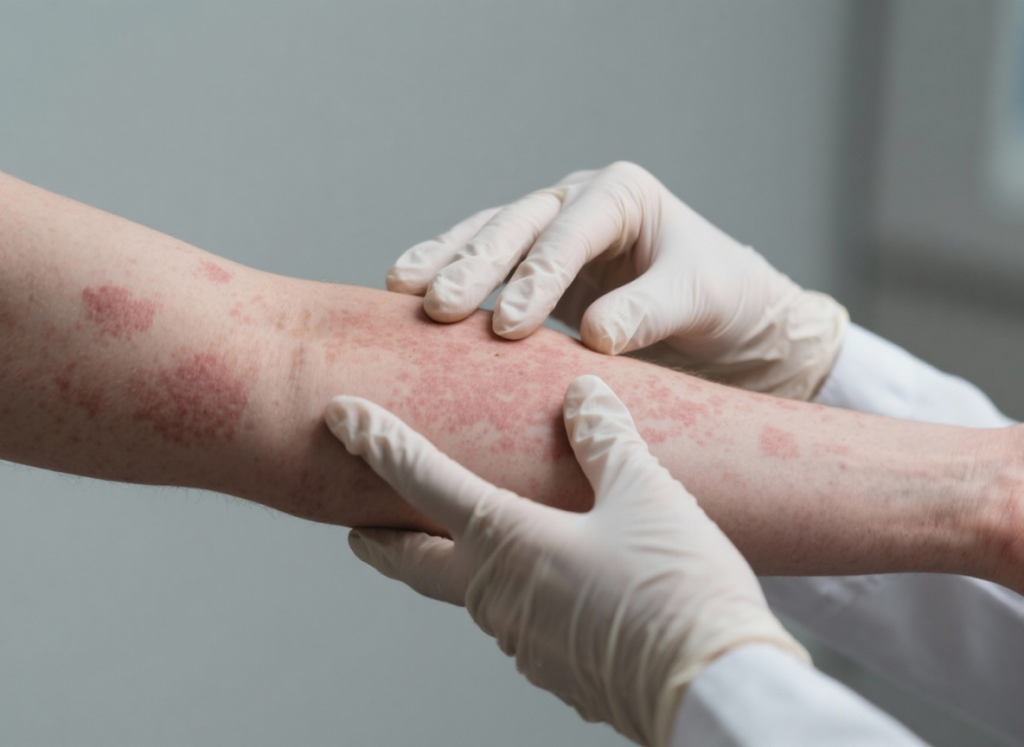Eczema is common and often manageable with simple daily care. But if flare-ups keep returning, last longer than usual, or stop responding to your normal routine, it might be time to see a doctor about eczema.
Our guide explains when to see a doctor for eczema, what warning signs to watch for, and how professional help can make a difference.
Remember, it’s not a substitute for medical advice. If you’re ever unsure, speak to a qualified pharmacist here at WePrescribe for support.
If Your Eczema Does Not Improve with Self-Care
Most mild eczema improves with regular moisturising and gentle care. Using fragrance-free creams, avoiding harsh soaps, and keeping skin hydrated usually help. But if you’ve tried these steps and your skin stays dry, itchy, or inflamed, it may be time to see a doctor about eczema.
Sometimes, what looks like eczema could be something else, or your skin might need a tailored plan. If your over-the-counter eczema remedies are not working, don’t delay seeking advice; a GP or dermatologist can help identify what’s really happening with your skin.
When Symptoms Become Severe or Painful
Sometimes eczema can shift from a mild irritation to something far more uncomfortable. If your skin becomes cracked, bleeds easily, or feels sore to the touch, that’s a clear sign it needs professional attention. Severe itching that keeps you up at night or causes scratching until the skin breaks is another red flag.
These severe eczema symptoms can quickly affect your day-to-day life, from disrupted sleep to struggling with clothes rubbing against irritated patches. When pain or discomfort starts interfering with normal routines, it’s best to speak to a healthcare professional for persistent eczema medical advice.
You don’t have to wait until your symptoms feel unbearable. The earlier you reach out, the sooner a doctor can help you manage the flare-up and prevent the condition from worsening.

If You Notice Signs of Infection
Eczema can sometimes let bacteria enter the skin, leading to infection. This isn’t uncommon, but it does mean you’ll need medical advice rather than self-care alone. Look out for any changes that seem unusual, such as:
- Skin that feels hot, swollen, or unusually tender
- Pus or oozing fluid
- Yellow or golden crusts forming over the affected area
- Redness that spreads or gets worse instead of calming down
If any of these appear, it’s time to see a doctor about eczema that might have become infected. Promptly treating infected eczema can prevent complications and help your skin heal safely.
Try not to ignore these warning signs or cover them up with more creams. A doctor can check whether an infection is present and advise on the safest next steps for your skin.
When Eczema Disrupts Your Sleep or Daily Life
Eczema isn’t just about dry or itchy skin; it can also take a toll on your rest, focus, and mood. If constant irritation keeps you awake or you find yourself tired and distracted during the day, that’s a sign your skin needs more support.
Sleep problems as a result of eczema can build up over time, affecting both mental and physical health.
When itching, discomfort, or broken sleep start to interfere with your work, studies, or family life, it’s worth speaking to a GP or dermatologist. They can help identify what’s triggering the issue and suggest ways to get things back under control.
There’s no need to push through constant exhaustion or discomfort. Getting persistent eczema medical advice can help you find relief and give your body the chance to rest and recover properly.
If Your Child Develops Eczema at a Young Age
It’s common for babies and young children to develop eczema, often showing up as red, dry patches on the face, hands, or behind the knees. While this can be worrying, mild cases usually respond well to gentle skin care. However, because children’s skin is thinner and more sensitive, it’s best to see a doctor about eczema if symptoms persist or seem to worsen.
You should also speak to a healthcare professional if your child’s eczema is spreading quickly, becoming painful, or disrupting their sleep. Eczema in children can sometimes be linked to allergies or environmental triggers that need to be identified and managed carefully.
A GP or paediatric specialist can help you find out what’s driving your child’s symptoms and, if necessary, guide you towards an eczema referral to a specialist for longer-term support.

When Over-the-Counter Treatments Are Not Effective
For many people, mild eczema can be managed with emollients or barrier creams from a pharmacy. But if flare-ups keep returning or spreading, even after weeks of consistent care, your skin may need a closer look. When over-the-counter eczema remedies are not working, it often means the condition has become more complex or severe than it first appeared.
This doesn’t mean you’ve done anything wrong; eczema can change over time and respond differently to products that once worked well. A healthcare professional can assess whether there’s an underlying trigger, like an allergy, infection, or another skin condition mimicking eczema.
If your symptoms are worsening or simply won’t settle, it’s a good idea to see a doctor about eczema and ask whether a review or referral might help. You don’t need to wait until the problem feels unmanageable to get support.
If You Need Specialist Advice or Referral
Sometimes eczema doesn’t respond as expected, even after trying various skincare routines or GP-recommended treatments. In these cases, it might be time to ask for a referral to a dermatologist or allergy specialist. This step isn’t just for severe cases; it’s also useful when flare-ups are frequent, widespread, or affecting your confidence and comfort.
A specialist can help identify triggers you may not have noticed, run allergy or sensitivity tests, and create a plan tailored to your skin. If your GP suggests an eczema referral to a specialist, it’s not a cause for concern; it simply means your skin needs more detailed care.
Professional guidance can make managing eczema less frustrating and help prevent future flare-ups. It’s about understanding your skin better, not just treating symptoms as they appear.
Eczema can usually be managed at home through treatment available here at WePrescribe, but if symptoms persist, worsen, or affect your daily life, it’s time to see a doctor about eczema. Signs like severe eczema symptoms, ongoing eczema sleep problems, or over-the-counter eczema not working all warrant professional advice.
A GP can assess your skin, guide treatment, and arrange an eczema referral to a specialist if needed. For more information, contact us to speak with one of our pharmacists today to work towards itch-free days.


